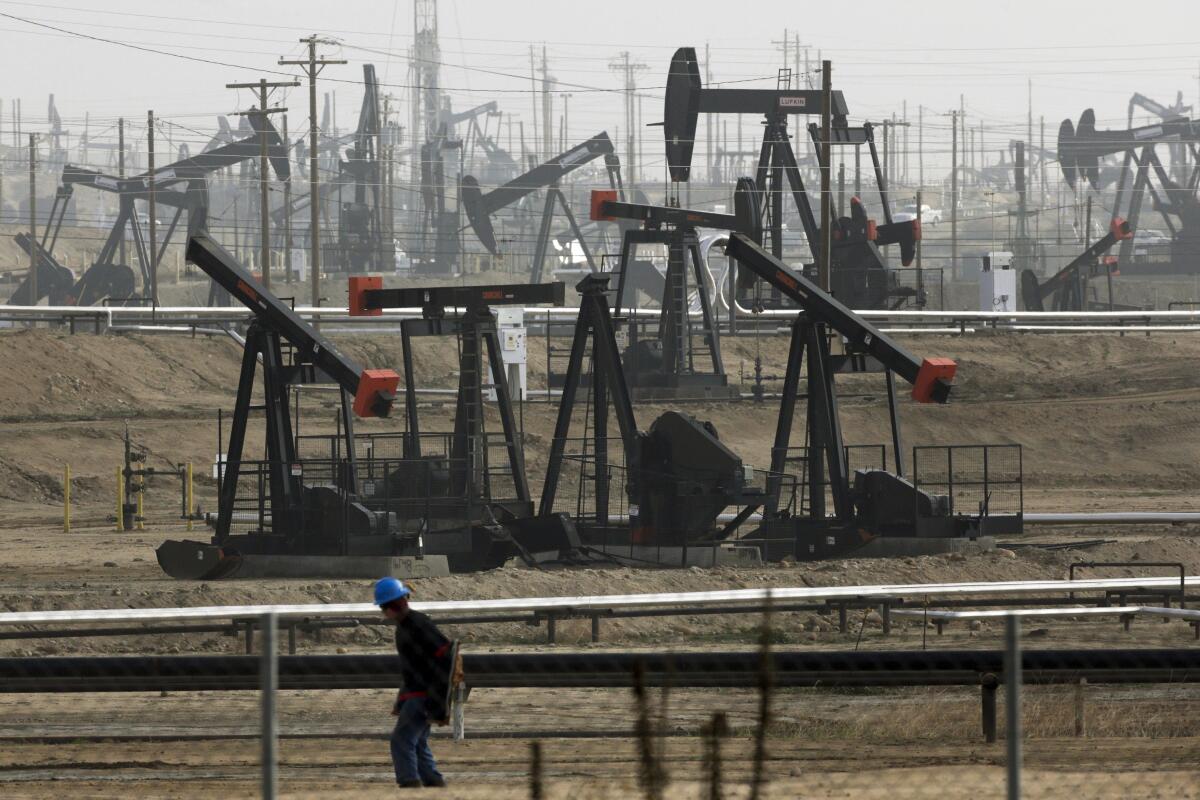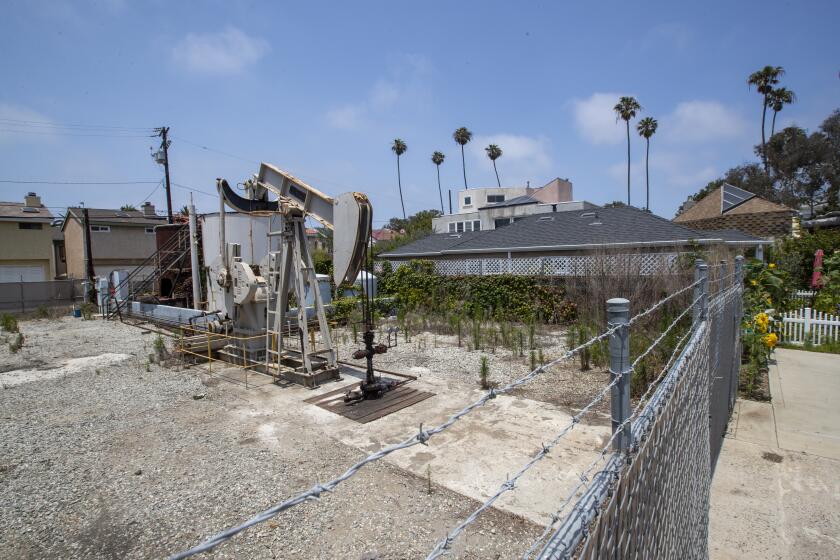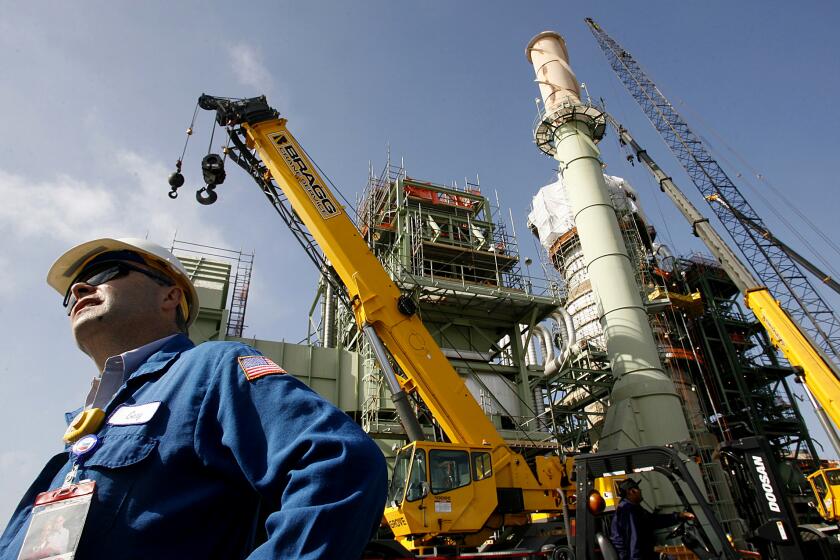Op-Ed: If our oil jobs are ending, we need safety nets and good replacement work

- Share via
Just days after the latest oil spill off the Huntington Beach coast, Gov. Gavin Newsom came to Orange County. In response to renewed calls to ban offshore drilling after about 25,000 gallons of crude oil poured into the Pacific Ocean, the governor commented, “Banning new drilling is not complicated. The deeper question is how do you transition and still protect the workforce?”
I belong to the workforce Newsom speaks of. I’ve worked at a Los Angeles oil refinery for over 22 years as a member of United Steelworkers Local 675. USW represents thousands of workers across Los Angeles, Kern and Contra Costa counties who run refineries, oil wells, pipelines and terminals. Over the last 100-plus years, our workers have shown up and labored without fail through earthquakes, riots, world wars, fires and most recently the pandemic. We supply fuel for plane trips, backup generators for hospitals and materials for syringes that have been crucial as we contain the coronavirus crisis.
Even before the renewed calls to halt drilling, we have felt like our jobs are threatened. When we watch football, we see repeated ads for hybrid and electric cars and now electric trucks like the Ford F-150 Lightning. In California, every new car sold after 2035 is to be an electric vehicle.
The writing is on the wall. As California pursues our goal of cutting emissions 40% by 2030, the resulting closure of the oil and gas industry means about 37,000 fossil fuel workers will need reemployment, while an additional 20,000 workers or so will voluntarily retire in the next nine years.
My father always said, “Failing to plan is planning to fail.” Though the energy transition is inevitable, a just version is not. Workers know what happens when whole industries go away: Companies maneuver behind our backs, squeeze every last drop of work out of a dying auto plant, steel mill or coal mine and shutter it overnight, devastating communities and stiffing workers out of jobs, pensions and healthcare. The fear is real of jobs lost with no plan for when operations begin to phase out.
The driving force behind Gov. Gavin Newsom’s decision is the public health risk linked to oil and gas production.
We’re also concerned for our communities: The loss in tax revenue will cripple county and city budgets, hampering our schools, libraries and other services. The loss of our good-paying jobs will have a serious ripple effect, especially in Kern and Contra Costa counties.
Many speak of a “just transition,” but we’ve never seen one. No worker or community member will ever believe that an equitable transition is possible until we see detailed, fully funded state safety net and job creation programs.
To offer these safety nets, California needs to establish an Equitable Transition Fund for fossil fuel workers covering wage replacement, income and pension guarantees, healthcare benefits, relocation and peer counseling for professional and personal support. It should provide access to education and training for existing and future jobs that are safe and healthy. California also needs to account for the funding gaps communities face when their tax bases shrink, so schools and libraries can stay open.
Longer term, transitioning the workforce should mean creating stable jobs with good pay and benefits. Right now, we earn well over minimum wage, meaning we can support our families. Many of us can own homes with fossil fuel jobs, and some of us earn six figures. If we start new work, we want to be able to continue supporting our loved ones.
Spoiler alert: It’s about the jobs.
We can create good new jobs for fossil fuel workers and others by investing in California’s climate goals. USW Local 675 was one of 20 unions, including three fossil fuel unions, that endorsed the California Climate Jobs Plan, a study published in June and led by economist Robert Pollin.
With money from California’s budget, federal funds, bonds and new revenue sources, the plan outlines $70 billion of public investments annually in safety net programs as well as renewable energy and energy efficiency projects, infrastructure upgrades and ecological agriculture. The goal is to reduce emissions and create 1 million new jobs in California by 2030. This will create opportunities for electricians, carpenters, bus drivers, teachers, engineers, planners and maintenance workers — including workers affected by the pandemic.
The best way to guarantee that these are good jobs and reduce disparity is to make sure they’re union jobs. Data show that union representation means higher wages, better benefits and working conditions, and a better life for workers and the communities they support.
With a fully funded equitable transition plan — meeting the immediate need for a safety net for workers and communities, and offering a bold vision to restructure our economy — we can jump-start recovery and move California’s workers, communities and the planet toward a more secure future.
Norman Rogers is the second vice president of United Steelworkers Local 675.
More to Read
A cure for the common opinion
Get thought-provoking perspectives with our weekly newsletter.
You may occasionally receive promotional content from the Los Angeles Times.












